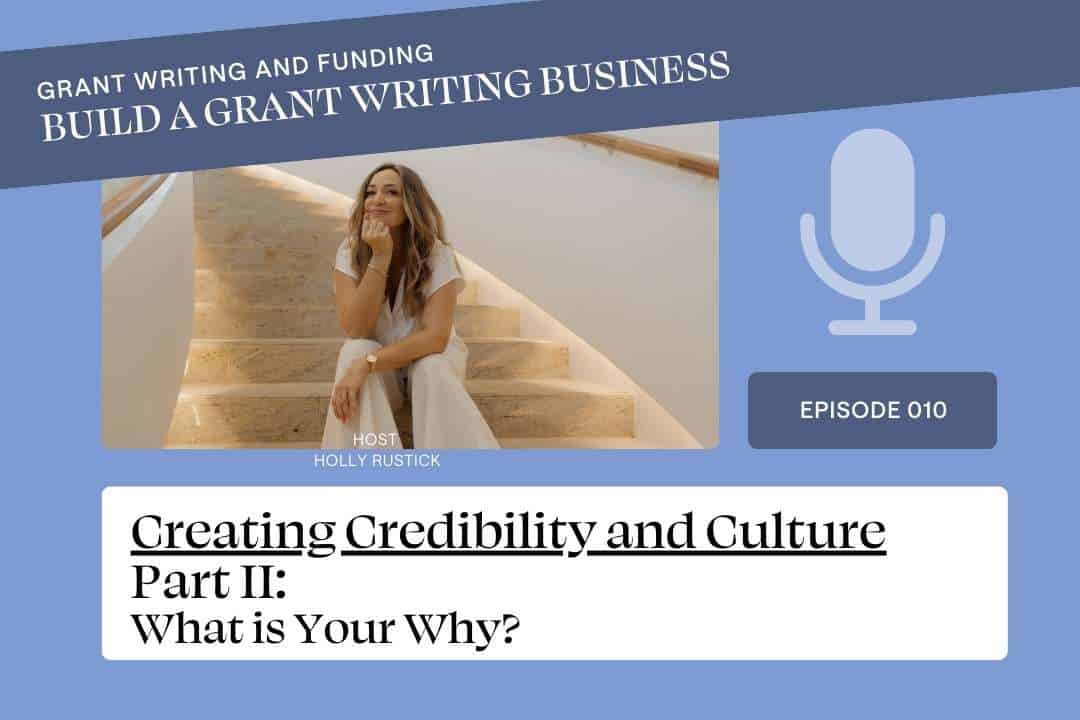Creating Credibility & Culture: Part II What is Your Why?

November 6, 2017
What is your why? Or more specifically, what is the why of your board members, employees, volunteers, and beneficiaries?
This question may seem like a no-brainer until you actually try and answer it.
Is your organization challenged by poor governance, a high turn-over staff rate, or disgruntled beneficiaries? It may be due to not asking these four questions that will articulate your ‘why'.
The four questions:
- What is your main passion for you being on this board/organization/beneficiary?
- What do you have to offer?
- What do you want in return?
- What change do you want to see by the end of your term/or end of the year?
These questions are great to be answered independently or within a group setting. I like the group setting as it creates dialogue and refines the mission and vision of the organization. I recommend doing this at least annually at board and staff retreats. As far as your beneficiaries, this is something you can also do annually or semi-annually. The great thing is you can use the answers to these questions as data, and also as a guide to focus on what grants and funding to secure.
Question One: What is your main passion for being on this board/organization/beneficiary?
This is a great question to really start the conversation with purpose and focus.
Board members can define why they are passionate to be on your board. Usually, it is due to having some kind of stake in the mission and vision of what your organization does. Employees and/or volunteers may answer this in the same light, or they may have totally different reasons. Beneficiaries may be there to receive services and are passionate to be a part of what your organization does.
Question Two: What do you have to offer?
This question is great as it allows people to identify what they bring to the table, while at the same time recognizing their own value.
Board members may offer their professional skills, such as being a CPA and offering financial expertise, or networks with funding sources. Employees and/or volunteers may offer community development skills, specific expertise in social services, or grant writing skills. Beneficiaries may offer great insight into what your community needs.
Question Three: What do you want in return?
I love this question. This question allows people to really see that they also get value and aren't there to just give, give, give. This may be the most illuminating question that prevents burnout and negative energy.
Board members may want something that is not tangible, such as increasing their networks. Employees may want a living wage so they can continue their work. Volunteers may want training to increase their skills. Beneficiaries may want tangible resources, such as housing, food, programs, and so forth.
Question Four: What change do you want to see by the end of your term/or end of the year?
This is a great question to ask board members what impact they want to see by the end of their term. You can also pose this question for employees of what impact they want to see within their own job position and what impact they want the organization to achieve by the end of the year. Beneficiaries may answer this question in light of what change they want in their life by the end of their time within the project (if it is time-bound) or by the end of the year.
There it is. The four questions that can articulate your why and prevent burnout and staff turnover!
To share your thoughts:
Send Holly an email at holly@grantwritingandfunding.com
To help out the show:
Leave an honest review on iTunes. Your ratings and reviews really help, and I read all of them!
To learn more and increase your skills:
Click here to check out Holly's Signature Courses
To pick Holly's brain:
Click here to book your 1:1 Call with Holly
Holly Rustick
Meet the author Holly Rustick
Work with Me
Write Grants, Get Paid.
Freelance Grant Writer Academy
Grant Professional Mentorship
JOIN OUR NEWSLETTER
Holly Rustick is a world-renowned grant writing expert and Amazon bestselling author.
Holly has been coaching grant writers how to run successful 5-6 figure businesses since 2017.
With two decades of grant writing and nonprofit experience, Holly is a popular keynote speaker for events all over the world, podcast host of the Top-Ranked Grant Writing podcast, a former university instructor, and is past president of the Guam Women’s Chamber of Commerce. She is constantly booked out to run trainings to help grant writers grow capacity, increase funding, and advance mission.
Love this post? You'll love these resources.
GET ACCESS NOW
Free Grant Writing Class
Get the proven 7 steps to eliminate anxiety and get Holly’s 20 years of secrets to start writing winning grants.
You will get the grant writing system that has helped Holly secure more than $25 million in grant funding and students earn more than $100,000,000 in funding for nonprofits around the world!
GET ACCESS NOW
Free 5-Step Checklist
OUR SPICY BELIEF IS THAT ALL GRANT WRITERS SHOULD START A BUSINESS, EVEN IF IT’S PART-TIME.
Work from home and have a massive impact on your community. Set up a grant writing business so you can start getting paid to write grants.